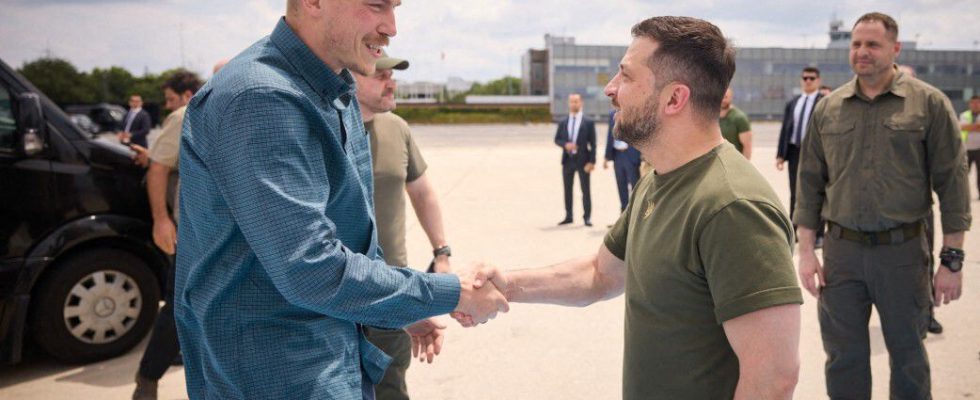The Kremlin denounced, furious, Saturday, July 8, the repatriation by the Ukrainian president of several commanders who were to remain in Turkey until the end of the conflict, according to an agreement established between Moscow and Kiev. The country announced at the end of September the exchange with Russia of 215 soldiers transferred to Turkey, including 5 defense chiefs from the Azovstal steelworks, described as “superheroes” by Volodymyr Zelensky. They were to remain there “in absolute safety and in comfortable conditions” until “the end of the war”, according to the agreement made with President Erdogan.
The Ukrainian presidency confirmed having obtained the return of these members of the Azov regiment, after “negotiations with the Turkish side”. Celebrated as heroes in Ukraine for their tenacious resistance within the Azovstal factory during the siege of Mariupol, the Azov fighters are reviled in Russia for their links with Ukrainian ultranationalist and neo-Nazi circles. They were met at Istanbul airport by President Zelensky, who was on a visit to Turkey.
“The return of Azov commanders from Turkey to Ukraine is nothing but a direct violation of the terms of existing agreements,” Kremlin spokesman Dimitri Peskov was quoted by news agencies as saying. Russian press. According to him, Turkey is under “a lot of pressure” as the NATO summit in Vilnius approaches on July 11 and 12.
Grains deal in jeopardy again
Volodymyr Zelensky spoke at length with the Turkish president, who maintains close ties with both kyiv and Moscow. During the exchange, mention was made of the July 2022 agreement, which allows Ukraine to export grain across the Black Sea despite the war. That deal expires on July 17, and Russia has said it sees no reason to extend it.
“We hope that the agreement will be extended,” said Turkish President Erdogan, who intends to raise the subject with Vladimir Putin, whom he is due to receive in August. Asked about this visit on Saturday, the Kremlin spokesman remained evasive. “Contact is possible. There are no dates yet,” said Dmitry Peskov, quoted by Russian news agencies.
Eight killed in Russian bombardment in eastern Ukraine
At least eight people were killed and 13 injured in a Russian shelling of the eastern Ukrainian town of Lyman on Saturday, on the 500th day of the war, the Ukrainian Interior Ministry said. The strikes took place around 10 a.m. on two crossroads 200 meters apart and lined with small shops and cafes where the inhabitants were numerous at that time, AFP journalists noted in the afternoon, and according to witnesses . No impact crater is visible. According to soldiers interviewed, these are cluster munitions whose shrapnel killed and injured the victims.
Ukraine also obtained a commitment from Washington on Friday to deliver cluster munitions, this very controversial weapon for its dangerousness since they kill indiscriminately and represent a significant risk for civilians.
Winter Olympics: Russian athletes under neutral banners in China
Russian and Belarusian athletes will be able to participate under a neutral banner and individually in the Asian Games scheduled in China in September, the organizers announced on Saturday. Meeting in Bangkok, the General Assembly of the Olympic Council of Asia (OCA) authorized the participation of a maximum of 500 athletes from the two countries, who will try to qualify for the 2024 Olympic Games in Paris. But she attached this authorization to several conditions. Athletes will not be eligible for medals. The OCA director general also stressed that no Russian or Belarusian politicians will be invited to the Asian Games, organized in Hangzhou at the end of September (from September 23 to October 8), and that the symbols of the two countries will be banned.
Athletes from both countries were banned from many sporting events after Russia invaded Ukraine in February 2022, before being able to participate again under certain conditions. On March 28, the International Olympic Committee (IOC) recommended the return of Russian and Belarusian athletes to international sports competitions, without commenting on their presence at the Paris Olympics, on several neutrality conditions: participation under a neutral banner, as individual, not having a contract with the Russian army or security services, or not having supported the war in Ukraine.
A virtual army of donors for Ukraine
Combining humour, derision and seriousness, a group of Internet users defending Ukraine on social networks and identifying themselves as Nafo organized their own summit in a nightclub in Vilnius on Saturday July 8, two days before the summit of the leaders of the ‘NATO. With tens of thousands of netizens donating to Ukraine, the North Atlantic Fella Organization — for North Atlantic Guys Organization, abbreviated as Nafo — has a knack for using memes against propaganda Russian, with a consummate art of sarcasm and mockery.
“We raised between 15 and 20 million dollars,” says, without being able to say precisely how much, Paul Peterson, one of the founders of Nafo and American truck driver. On Twitter, where Nafo’s account has more than 108,000 followers, and other social media platforms, the community is wielding humor to counter Russian narratives. On Saturday, more than 100 people attended the Nafo summit in disco.
The initiative has not gone unnoticed by the Ukrainian political class and NATO member countries. Ukrainian President Volodymyr Zelensky presented Nafo with a special plaque in recognition of their efforts, and a tweet from Ukraine’s Defense Minister Oleksiy Reznikov supporting the community helped give it momentum the year last.
Lithuanian Foreign Minister Gabrielius Landsbergis himself attended the Nafo “summit” and addressed the participants. “You’re funny, but you’re not a joke,” he told the audience. “Your community is an example of the creativity and ingenuity of people free to associate and express themselves in a democracy, and that is the strength of our system,” he added.
